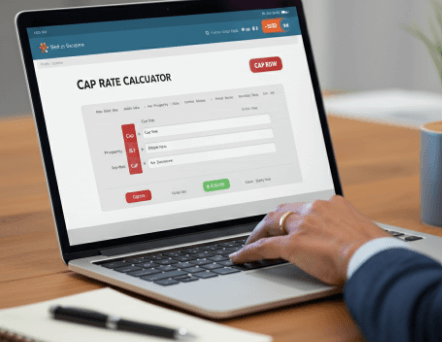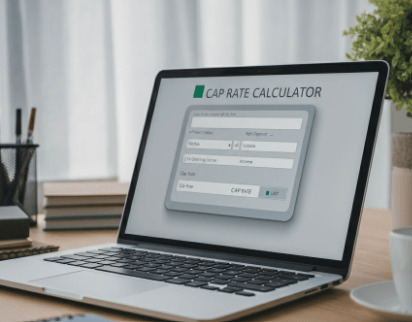What does a cap rate calculator calculate? A cap rate calculator determines the capitalization rate by dividing the property’s net operating income (NOI) by its current market value, helping investors assess the profitability of real estate investments. When venturing into real estate investment, understanding the potential returns on your investments is crucial. One vital metric that investors often rely on is the capitalization rate or cap rate. But you might ask, what does a cap rate calculator calculate and why is it so essential?
This blog aims to demystify the concept by providing a comprehensive explanation, ensuring you grasp the basics to make informed decisions. By the end of this article, you’ll have a clear answer to “What does a cap rate calculator calculate?” and how it can be a valuable tool in assessing the profitability of your real estate investments.
Experienced real estate investors like Steve Daria and Joleigh often utilize cap rate calculators to assess the profitability of potential investments. This tool calculates the capitalization rate by dividing the net operating income (NOI) by the property’s current market value. Steve and Joleigh can make more informed decisions using a cap rate calculator based on accurate financial projections.
What Does a Cap Rate Calculator Calculate?
A cap rate represents the ratio of a property’s net operating income (NOI) to its current market value, expressed as a percentage.
This metric is instrumental in helping investors compare different investment opportunities by normalizing the return relative to the property’s cost.
A higher cap rate typically signifies a potentially higher return on investment, though it may also indicate higher associated risks.

Understanding cap rates empowers investors to make well-informed decisions that go with their financial goals and risk tolerance.
Formula for Cap Rate
The formula for calculating cap rate is fundamental and easy to apply:
Cap Rate = (Net Operating Income / Current Market Value) x 100
This formula allows investors to directly compare the profitability of properties irrespective of their purchase prices.
Benefits of Using a Cap Rate Calculator
Understanding “What does a cap rate calculator calculate?” offers many advantages for real estate investors.
Here’s why they are considered indispensable tools in the industry:
Streamlined Decision-Making
Cap rate calculators simplify the evaluation of potential real estate investments by automating complex calculations.
By inputting essential data such as net operating income and property value, these calculators swiftly generate accurate cap rates.
This efficiency allows investors to focus more on strategic decision-making rather than getting bogged down in arithmetic.
Improved Accuracy
Manual calculations are prone to errors, leading to inaccurate investment assessments.
Cap rate calculators mitigate this risk by providing precise and reliable results consistently.
This accuracy is critical for making sound investment decisions, as even minor inaccuracies can significantly impact projected returns and financial outcomes.
Time Efficiency
By reducing the time spent on calculations, cap rate calculators enable investors to expedite their due diligence process.
This efficiency is invaluable in competitive real estate markets where timely choice can make a substantial difference in securing profitable opportunities.
Get An Offer Today, Sell In A Matter Of Days
How to Use a Cap Rate Calculator
To further understand “What does a cap rate calculator calculate?” and how to use it, follow these steps to properly utilize this tool:
- Collect Property Data: Gather necessary information about the property, including its net operating income (NOI) and current market value.
- Input Data: Enter the collected data into the cap rate calculator, ensuring accuracy in figures.
- Analyze Results: Review the calculated cap rate to ascertain the property’s potential return on investment. Compare it with industry benchmarks and your investment objectives.
Key Factors That Influence Cap Rates
Several factors influence a property’s cap rate, impacting its attractiveness as an investment.
Understanding these variables is crucial for making correct investment decisions:
- Location: Properties situated in high-demand areas often command lower cap rates due to higher purchase prices and stable demand.
- Property Type: Different types of properties (e.g., residential, commercial) exhibit varying cap rates based on market dynamics and tenant profiles.
- Market Conditions: Economic factors like interest rates, inflation, and local market trends can significantly influence cap rates.

Cap Rate in Different Real Estate Sectors
The application of cap rates varies across different sectors within the real estate market.
Here’s how cap rates function in various property types:
- Residential Properties: Cap rates in residential real estate tend to be lower, reflecting stable demand and lower perceived risk.
- Commercial Properties: Commercial properties often feature higher cap rates, indicative of potential risks associated with business tenants and market volatility.
- Industrial Properties: Cap rates for industrial properties can vary widely, influenced by factors like location, tenant stability, and industry demand cycles.
Strategies for Using Cap Rate Calculators
To maximize the utility of cap rate calculators in your investment endeavors, consider implementing these effective strategies:
- Comparative Analysis: Use the calculator to compare multiple properties simultaneously, identifying the most promising investment opportunities based on their cap rates.
- Scenario Planning: Adjust variables such as NOI and market value within the calculator to simulate different investment scenarios. This practice helps forecast potential returns and assess risk tolerance.
- Portfolio Diversification: Utilize cap rate calculators to diversify your investment portfolio across various property categories and geographic locations, minimizing risk and maximizing returns.
Common Mistakes to Avoid
While cap rate calculators are invaluable tools, steer clear of these common pitfalls to ensure accurate investment assessments:
- Ignoring Operating Expenses: Always include all operating expenses when calculating NOI to obtain a true representation of profitability.
- Overlooking Market Trends: Stay informed about current market trends and economic indicators to ensure your cap rate calculations reflect accurate market conditions.
- Relying Solely on Cap Rate: While cap rate provides a fundamental metric, consider complementary factors such as cash flow, property appreciation potential, and overall market stability in your investment analysis.
Conclusion
Investing in real estate demands careful analysis and strategic decision-making. A cap rate calculator emerges as an indispensable tool for assessing property investments, providing clarity on potential returns while enhancing efficiency and accuracy in decision-making processes.
Take proactive steps in your real estate journey by leveraging cap rate calculators to analyze investment opportunities effectively. Stay informed, employ data-driven strategies, and unlock the full potential of your property investments.
**NOTICE: Please note that the content presented in this post is intended solely for informational and educational purposes. It should not be construed as legal or financial advice or relied upon as a replacement for consultation with a qualified attorney or CPA. For specific guidance on legal or financial matters, readers are encouraged to seek professional assistance from an attorney, CPA, or other appropriate professional regarding the subject matter.

